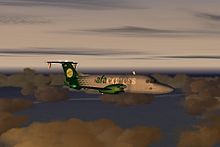- Vehicle simulation game
-

Part of a series on: Simulation video games - Construction and management simulation
- Life simulation game
- Sports game
- Vehicle simulations
Vehicle simulation games are a genre of video games which attempt to provide the player with a realistic interpretation of operating various kinds of vehicles. This includes automobiles, aircraft, watercraft, spacecraft, military vehicles, and a variety of other vehicles. The main challenge is to master driving and steering the vehicle from the perspective of the pilot or driver, with most games adding another challenge such as racing or fighting rival vehicles. Games are often divided based on realism, with some games including more realistic physics and challenges such as fuel management.
Contents
Definition
Vehicle simulation games allow players to drive or fly a vehicle. This vehicle can resemble a real one, or a vehicle from the game designer's imagination. This includes vehicles in the air, on the ground, over water, or even in space. Different vehicle simulations can involve a variety of goals, including racing, combat, or simply the experience of driving a vehicle. These games normally allow the player to experience action from the visual perspective of the pilot or driver.[1] Although "racing games are often sold in the sports category," Rollings and Adams argue that "from a design standpoint, they really belong in ... vehicle simulations".[2]
Game design
Goals and challenges
 Microsoft Flight Simulator focuses solely on the experience of flying an aircraft, in contrast to other games with missions and goals.
Microsoft Flight Simulator focuses solely on the experience of flying an aircraft, in contrast to other games with missions and goals.
The essential gameplay in a vehicle simulation is the physical and tactical challenge of driving a vehicle.[1] Mastery of vehicle control is the element which encourages players to continue playing, even after the game's goals have been completed.[3] Players learn to use appropriate speed and steering, and must avoid crashing by observing cues about how fast they are going.[1] There are some vehicle simulations where the player is given no specific goal, and is simply able to explore and experience using the vehicle.[1] In the absence of any competition, "some vehicle simulations aren't games at all"[2]
But most vehicle simulations involve some form of competition or race, with a clear winner and loser.[2] Some games add special challenges such as combat and slaloms.[1] Many types of driving games, including both military flight simulators and racing simulators, make use of careers and campaigns. Players must complete different tracks or missions, and collect victories and other achievements based on their performance.[1]
Realism and physics
The market for vehicle simulators is "divided between the purists and the casual players".[2] A variety of vehicle simulators have been created to serve both markets. Purists demand total accuracy, whereas casual players are less concerned with such details. This level of accuracy depends on how damage, physics, environment, weather, and controls are implemented.[2] For example, accurate flight simulators will ensure that the vehicle responds slowly to their controls, while other games will treat the plane more like a car in order to simplify the game.[1]
In both driving games and flight simulators, players have come to expect a high degree of verisimilitude where vehicles are scaled to realistic sizes.[1] These types of games usually utilize a highly accurate time scale, although several flight simulators allow players to fast forward through periods where there is nothing interesting happening.[1] In the case of space or water vehicle simulations, the gameplay physics tend to follow those of flying and driving simulations.[1]
These games will add variety by having a variety of vehicles with different performance characteristics, such as sharper turning or faster speed.[1] Many games make use of real life vehicles, including military vehicles or cars from major automobile manufacturers.[1]
Non-driving roles
Although vehicle simulations focus on driving a vehicle, many games involve non-driving roles. For more detailed racing simulations, the player may sometimes play the role of a mechanic who repairs or augments their vehicle. In games with a combat element, this might involve manning a separate combat station on a larger vehicle. Some games such as Their Finest Hour allow players to alternate between piloting the vehicle or manning the waist or tail guns. Megafortress allowed players to operate five separate stations for combat and managing the vehicle.[1] Games that make use of combat have competition modes similar to first-person shooters, where player must defeat human or artificial intelligence opponents.[1]
Sub genres and vehicle types
Rollings and Adams note that "the vast majority of vehicle simulators are flight simulators and driving (usually car-racing) simulators".[2] However, this genre includes any game that creates the feeling of driving or flying a vehicle, including the magic broomsticks in the Harry Potter games.[1] More common examples include simulations of driving trains, spacecraft, boats, tanks, and other combat vehicles.[2]
Further information: Vehicular combat game and Submarine simulatorMost watercraft simulations are of "powerboats or jet skis".[2] Gameplay differs from driving a car because of the fluid medium, which affects turning. These games involve racing through a course marked by buoys, with some tracks allowing the player to make jumps.[1] Sailing simulations are rare, as the complexity of controlling a sailboat appeals to only a specialized market.[1] However there has been a growing market after Nadeo introduced their Virtual Skipper games. Another rather popular sailing game is Sail Simulator 2010. These two games can both be played online against other sailors around the world.
This category includes submarine simulations, which typically focus on old-fashioned submarine activities such as firing torpedoes at surface ships.[1] Simulations of warships are more rare. Due to their slow speed, games such as Harpoon and Dangerous Waters simulate naval warfare involving entire fleets.[1]
Flight simulators
Further information: Flight simulator and Combat flight simulatorFlight simulators "tend to fall into military or civilian categories".[2]
- Civilian flight simulator: Microsoft Flight Simulator is a notable example of a civilian flight simulator.[1] These games "seldom have any victory conditions, unless they implement racing or specific challenges, such as tests of speed and accuracy".[2] Still, players can be presented with a variety of challenges including flying at night, or flying in harsh weather conditions. One of the most difficult challenges is to land the plane, especially during adverse weather conditions.[1]
- Military flight simulators: Military or combat flight simulators demand that players "achieve the mission's objectives, usually attacking enemy aircraft and ground installations".[2] These games depend heavily on the aircraft or role being simulated, where fighter planes largely engage with enemy aircraft, while bombers are designed to attack targets on the ground.[1] A unique aspect of these games is the ability to view ground targets, or view the action from the perspective of a bomb or missile.[1] Players are often confronted with a series of missions with both primary and secondary objectives, and victory is achieved by completing a combination of goals.[1] Many games will also award different levels of victory based on how many objectives were completed, or how much time or damage the player took.[1]
Racing games
Further information: Racing video game and Sim racingRacing video games "tend to fall into organized racing and imaginary racing categories".[2]
- Racing simulations: Organized racing simulators attempt to "reproduce the experience of driving a racing car or motorcycle in an existing racing class: Indycar, NASCAR, Formula 1, and so on."[2] These games draw on real-life to design their gameplay, such as by treating fuel as a resource, or wearing out the car's brakes and tires.[1] Damage is often modeled as a single variable, with more accurate simulations modeling damage to different areas of the car with differing consequences.[1] Aside from trying to win races without crashing, players will sometimes earn prize money that they can spend on upgrading their race car.[1]
- Arcade racing games: Less realistic racing games, sometimes called imaginary or arcadelike racing games, involve "imaginary situations, driving madly through cities or the countryside or even fantasy environments".[2] These games focus less on realistic physics, and may add other challenges such as collecting power-ups, driving through hoops and cones, or shooting weapons at rival players.[1]
Spacecraft simulators
Further information: Space flight simulator gameAside from quasi-educational games about space shuttles, game developers have avoided making realistic space flight simulators because they behave too slowly to interest a wide audience.[2] Thus, Spacecraft simulation games are typically science fiction games, such as the Wing Commander series. Most games involve piloting a fighter craft in while managing ammunition and damage, although there are capital ship simulations that involve more strategic control of a wide range of weapons and equipment.[1]
Tank and mech simulators
Further information: Vehicular combat game and MechaVehicular combat simulators include tank simulations and mecha simulations.[2] Aside from piloting the vehicle, a key element of gameplay is controlling a rotating turret.[1] These games are seldom fully accurate,[2] as realistic tanks are slow and have limited visibility, which would limit their appeal to casual gamers.[1] Games have made use of mechs in order to appeal to a wider audience, as they can add weapons and capabilities that are not restricted by reality.[1]
Train simulator
Further information: Train simulatorThis genre also includes simulations of driving trains.[2] A train simulator is a computer program that simulates rail transport operations. This includes other kinds of railborne vehicles, such as a tram.
References
- ^ a b c d e f g h i j k l m n o p q r s t u v w x y z aa ab ac ad ae af ag Rollings, Andrew; Ernest Adams (2006). Fundamentals of Game Design. Prentice Hall. http://wps.prenhall.com/bp_gamedev_1/54/14053/3597646.cw/index.html.
- ^ a b c d e f g h i j k l m n o p q r Rollings, Andrew; Ernest Adams (2003). Andrew Rollings and Ernest Adams on Game Design. New Riders Publishing. pp. 395–415. ISBN 1-59273-001-9. http://proquest.safaribooksonline.com/1592730019/ch13.
- ^ Howland, Geoff (1999-07-09). "Game Design: The Addiction Element". GameDev.net. http://www.gamedev.net/reference/articles/article263.asp. Retrieved 2007-12-11.
Video game genres Action Action-adventure Adventure Role-playing game Simulation Strategy Vehicle simulation Flight simulator (Amateur flight sim · Combat flight simulator) · Racing game (Driving simulator · Sim racing) · Space flight simulator · Submarine simulator · Train simulator · Vehicular combatOther genres Adult game (Eroge) · Advergame · Art game · Christian game · Edugame · Exergame · Maze game · Music game (Rhythm) · Non-game · Party game · Programming game · Puzzle game · Serious game · Traditional gameRelated concepts Categories:- Video game genres
- Vehicle simulation games
Wikimedia Foundation. 2010.
